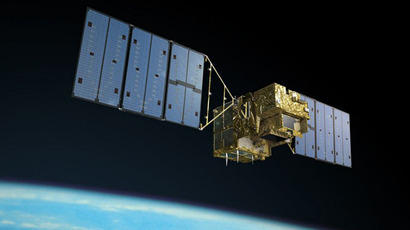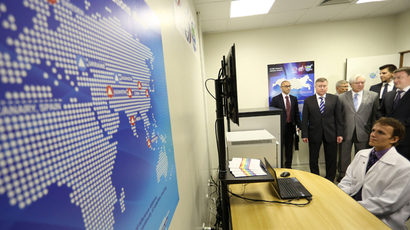US military satellites vulnerable in future space war – Space Command chief

US military satellites could be disabled or destroyed in the event of a war in space, an American general has said, citing China’s tests of anti-satellite weapons. To protect US space capability, the satellite park should be reformed, he believes.
American satellites are defenseless against a possible attack in space, and their destruction “would create a huge hole” in the country’s capability for high-tech warfare, Gen. William Shelton, the commander of the US Air Force Space Command said in a speech on Tuesday, as cited by The Washington Free Beacon.
According to Shelton, most critical are the satellites providing
the US Army with survivable communications and missile warning.
But each of those $1 billion satellites could be easily blocked
or destroyed by anti-satellite systems developed in countries
like China.
While electronic jammers could be “a cheap and effective way
of blocking our signals from space” and laser attacks could
“blind” the satellite imaging or even render it
dysfunctional, “direct attack weapons, like the Chinese
anti-satellite system, can destroy our space systems,”
Shelton stressed.
A dependence on cutting-edge space technologies has become a
“double-edged sword” for the US, the Space Command chief
said.
The US general was apparently referring to the official reports
of China recently conducting a test of a high-earth orbit
anti-satellite missile.
According to the latest annual report of the congressional
US-China Economic and Security Review Commission, the test
reflects “China’s intent to develop an [anti-satellite]
capability to target satellites in an altitude range that
includes US Global Positioning System (GPS) and many US military
and intelligence satellites.”
Another scare for the US military is a group of small
maneuverable systems reportedly launched by China as part of its
anti-satellite program ASAT. US defense officials have disclosed
last January that one of the Chinese systems includes a robotic
arm that can be used to capture or destroy orbiting satellites.
Even China’s successful landing of a robot rover on the moon in
December is a proof of the country’s “aggressive” space
program, Shelton has argued. According to him, space, the
“ultimate high ground,” has become “contested in all
orbits” and filled with “man-made threats.”
Speaking for the country that heavily relies on satellite
technology in military operations, such as for launching targeted
strikes, Shelton lamented how “in every medium, mankind has
found a way to make it a medium of conflict… land, sea, undersea,
air and now space and cyber.”

Deterring activity against US space capability, discouraging “nefarious actions in space” and dissuading “even building systems that provide that capability to potential adversaries” is a “tremendous challenge” for the US military, the general said.
Warning that “signs of a radically different space environment are all there,” Shelton stressed he is “not a fan of waiting for a catastrophe to propel change.” He called for switching to “architectural alternatives,” which are now studied by military and industry.
Such alternatives include replacing large multiple-payload satellites by numerous smaller and simpler systems, Shelton said. That will at least complicate “targeting calculus” of the adversaries, the general believes.
He also advocated the use of “disaggregation” method in US military space missions, such as equipping commercial communications satellites with missile-warning sensors. The recent tests of such method have proved “very successful,” Shelton said.
A better communication with the Chinese military on its space warfare efforts is necessary and could avert a future military “miscalculation” in space, Shelton believes.
At the same time, the American general said joining the international space code of conduct put forth by the European Union and promoted by Russia and China would “unnecessarily constrain” the US operations in space.
He dismissed the idea of watching over a vast orbiting space as unrealistic, adding that such space agreement “would require honest participants.” The US has been urged to join the talks on the space code by the EU, and the Obama administration announced in 2012 it was considering joining the discussion.
The agreement is needed as space has become crowded with around 1,000 active satellites and 23,000 pieces of space debris. According to Shelton, over 60 nations have a financial stake in at least one satellite and 11 countries have space launch capabilities.
However, Washington is keen to “constantly work to maintain” its “freedom of navigation and freedom of maneuver” in space, Shelton stressed.














